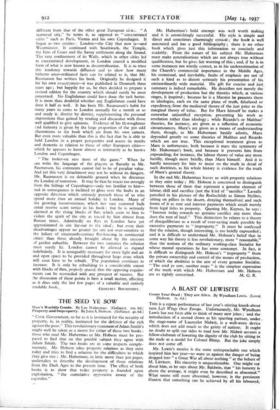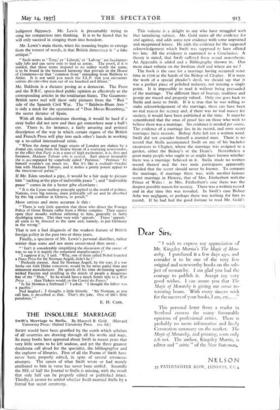A BLAST OF LEWISITE
Count Your Dead : They are Alive. By Wyndham Lewis. (Lovat Dickson. 7s. 6d.) THIS is a repeat performance of last year's stirring knock-about turn Left Wings Over Europe. Unfortunately, Mr. Wyndham Lewis has not been able to think of many new jokes ; and the introduction of a second clown as his sparring partner, under the stage-name of Launcelot Nidwit, is a well-worn device which does not add much to the gaiety of nations. It ought no doubt to split our sides to read how Mr. Nidwit accuses a fellow-clubman of lowering the dignity of the club by sitting in the nude as a model for Colonel Blimp. But the joke simply does not come off.
Mr. Lewis's motive is the same unimpeachable one which inspired him last year—to warn us against the danger of being dragged into " a Great War all about nothing " at the behest of M. Litvinov. His sincerity is unquestionable. One might say about him, as he says about Mr. Baldwin, that " his honesty is above the average, it might even be described as abnormal." What seems still more abnormal, however, is the persistent illusion that something can be achieved by all his laboured, indignant flippancy. Mr. Lewis is presumably trying to sting his compatriots into thinking. It is to be feared that he will only succeed in stinging them into boredom.
Mr. Lewis's main thesis, when his meaning begins to emerge from the torrent of words, is that British democracy is " a fake antique."
" Such terms as Tory,' or Liberal,' or Labour ' are fundamen- tally fake and can serve only to lead us astray. The proof, if it is needed, that these terms respond to no reality worth the name, is to, be found in the bemused harmony that prevails in the House of Commons—in that common front ' extending from Baldwin to Attlee. It is not until you reach the I.L.P. that you encounter seribiis dissent—five men out of six hundred and fifteen."
Mr. Baldwin is a dictator posing as a democrat. The Press and the B.B.C. spoon-feed public opinion as effectively as the corresponding articles in the totalitarian States. The Gaumont- British news reel will show only pictures from the " Red " . • side of the Spanish Civil War. The " Baldwin-Blum Axis " is only a mask for the operations of "Don Moses Rosenberg," the secret dictator of Spain.
With all this indiscriminate shooting, it would be hard if a stray bullet did not now and then get somewhere near a bull's eye. There is, for instance, a fairly amusing and pointed description of the way in which certain organs of the British and French Press will play into each other's hands in working up a so-called international crisis.
" When the damp and foggy _streets of London are shaken by a dismal cry, rising from the hoarse throat of a scurrying newsvendor, to the effect that Paris is in a state of high excitement, it is, first and foremost, Madame Tabouis who is excited. And almost invariably she is accompanied by somebody called Pertinax.' Pertinax ' by himself wouldn't cut much ice. But it's like a cocktail—bracket him with Madame Tabouis, and it makes a pretty potent appeal to the international palate."
If Mr. Eden smoked a pipe, it would be a fair quip to picture him " sucking at the pipe of indivisible peace " ; and "indivisible peace " comes in for a better gibe elsewhere :
" It is the Lyons teashop principle applied to the world of politics. NationS, even big nations, must politically sell out and be absorbed
by this big combine at Geneva, or perish."
More serious and more accurate is this : " There is very' little question that those who direct the Foreign Policy of Great Britain suffer from a Hitler complex. They cannot open their mouths without referring to him, generally in fairly disobliging terms. This they vary with appeals.' These appeals ' all seem to be directed to the same end, namely, to put Germany in the wrong."
That is not a bad diagnosis of the weakest feature of British foreign policy in the past two or three years.
Finally, a specimen of Mr. Lewis's personal diatribes, rather wittier than some and not more envenomed than most :
" Isn't it considerably simplifying the discussion of the causes of war, to say it is mainly the armament manufacturers ? '
' I suppose it is,' I said. Why, one of them Called Nobel founded a Peace Prize for Sir Norman Angell, didn't he ? '
Perfectly correct. And Sir Norman Angell, by the way, if a war broke out with Hitler tomorrow, would be far more guilty than any armament manufacturer. He spends all his time declaiming against wicked Fascists and instilling in the minds of people a dangerous fear of the " Hun." So he would have a much better title to a War Prize . . . than Vickers would, or the Comite des Forges.'
Is Sir Norman a firebrand ? ' I asked. ' I thought the fellow was a pacifist.' . .
Ned laughed ; I thought, a little bitterly. Sir Norman, as you call him, is described as that. That's the joke. One of life's little paradoxes.' "
E. H. CARR.















































 Previous page
Previous page